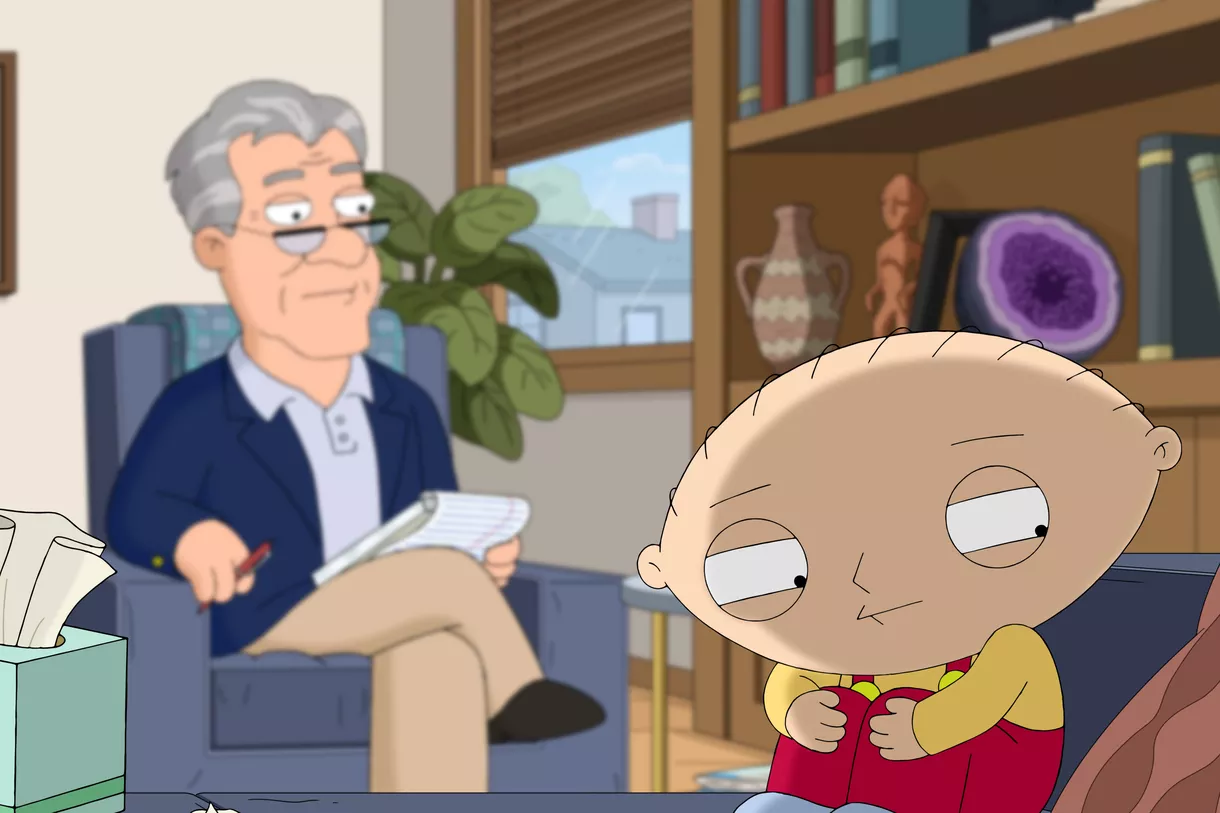‘Send in Stewie, Please’ – the future of Family Guy
Family Guy was often unfavourably compared to The Simpsons, and a further criticism has developed in the most recent seasons – fans complaining that it simply isn’t funny anymore and begging the showrunners to end it. Now that the show has entered its sixteenth season, beginning with an episode that has deviated from the show’s usual formula and proven incredibly divisive with the fans, what better time to analyse the state of Family Guy and ask whether it is truly time to put it out to pasture?
‘Send in Stewie, Please’ shunned the typical cutaway gags and family-based humour for a two-hander between Seth MacFarlane and Sir Ian McKellen. MacFarlane voices Stewie, who has been sent to the office of Dr Cecil Pritchfield (McKellen), a child psychologist, after pushing one of his classmates down the stairs. Critchfield’s analysis of Stewie leads to some interesting revelations about what makes the youngest Griffin tick.
It set itself up as offering a serious examination of Stewie, but then failed to really follow through
This episode was different in a number of ways, but the most promising way of all was something it failed to really capitalise on – it set itself up as offering a serious examination of Stewie, but then failed to really follow through. Stewie has undergone a drastic character change throughout the series – he began as a miniature evil villain of sorts, eager to kill his mother and take over the world, and evolved into a camp know-it-all (the fan reaction to this is poked fun at, because this is still Family Guy) – and he has rapidly become the show’s breakout character.
The problem is that the supposed breakthroughs in ‘Send in Stewie, Please’ just don’t really work, or they’re just an excuse for a lame gag. Despite much of the episode’s promotion proclaiming we would finally find out the truth about Stewie’s sexuality (something that isn’t too much of an appeal when the character is a one-year-old baby), it amounts to a line about him being ‘comfortable’ with his heterosexuality. His claims to have performance anxiety are a set-up for MacFarlane to sing a tune from Hamilton, coupled with an increasing amount of snot streaming from his nose – it’s not funny, nor particularly enjoyable. The reveal that Stewie is putting on his British accent, and that his real voice is essentially Seth MacFarlane’s, is an interesting idea negated by the fact that it’ll never be mentioned again.
‘Send in Stewie, Please’ has received a very mixed reception, with some fans loving the attempt at trying something new, and many believing that the whole thing fell flat
These revelations are offset by the fact that Stewie is built up in the episode as such an unpleasant character (something that every Family Guy character has suffered to some degree). This is evident in his relationship with Critchfield, who is voiced with a distant, sleepy quality of Sir Ian McKellen. We have a good five minutes of Stewie’s snarky analysis and deconstruction of Critchfield’s life, which felt cruel to watch, and we end on an even more unsavoury note – Stewie decides that he wants to keep up his façade, and so the only person who knows the real him must die. He denies Critchfield his heart medicine and watches him die (we’re meant to enjoy this because of a joke about his younger partner leaving him afterwards, but it really hits the wrong chord). Critchfield tells Stewie that he’ll regret it, and he does at the episode’s close, but that is almost certainly the last time we’ll hear about it.
Now, it’s good for any long-running show to try and keep things fresh, and Family Guy (to its credit) has always been one to experiment and change things up. ‘Send in Stewie, Please’ has received a very mixed reception, with some fans loving the attempt at trying something new, and many believing that the whole thing fell flat. An episode like this could have worked (the show has dealt with some very serious issues before, including domestic abuse in the surprisingly effective first half of ‘Screams of Silence: The Story of Brenda Q’), but it never really finds its feet here.
‘Send in Stewie, Please’ … tries to be insightful but can’t quite escape the need to be a Family Guy episode
Even some of Family Guy’s showrunners have acknowledged that there is a “burnout factor” in keeping everything fresh and interesting – they know that the plots are somewhat thin, and the characters are not particularly sympathetic. This is extremely evident in ‘Send in Stewie, Please’, which tries to be insightful but can’t quite escape the need to be a Family Guy episode. In Family Guy’s future, I hope we see more episodes like this. This one didn’t quite work, but there were the seeds for something fresh and exciting here, and that’s exactly what the show needs.

Comments